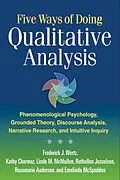Graduate students, instructors, and researchers in psychology, education, social work, family studies and human development, sociology, and nursing. Will serve as a text in graduate-level qualitative analysis courses and as a supplement in graduate-level qualitative methods, PsyD research methods, and humanistic psychology courses and in phenomenological research seminars.
Autorentext
Inhalt
Autorentext
Frederick J. Wertz is Professor of Psychology at Fordham University, where he served as department chair, received the Distinguished Teaching Award in the Sciences, and is a member of the Institutional Review Board. His scholarship focuses on the philosophy, methodology, theory, and cultural context of psychology. Kathy Charmaz is Professor of Sociology and Director of the Faculty Writing Program at Sonoma State University. Much of her scholarship has either used or developed grounded theory methods. She has received mentoring and lifetime achievement awards from the Society for the Study of Symbolic Interaction. Linda M. McMullen is Professor of Psychology at the University of Saskatchewan, where she served as department head and elected faculty member on the Board of Governors. Her research, which is qualitative and discursive in form, focuses on how people use language to do things and on how language shapes, and is shaped by, social and cultural contexts. She has received the Jillings Award from the Saskatchewan Psychological Association and the University of Saskatchewan Faculty Association Academic Freedom Award. Ruthellen Josselson is Professor of Psychology at the Fielding Graduate University. Her work uses narrative approaches to investigate a variety of topics. She is a recipient of the American Psychological Association's Henry A. Murray Award and Theodore R. Sarbin Award, and is a cofounder of the Society for Qualitative Inquiry. Rosemarie Anderson is Professor of Transpersonal Psychology at the Institute of Transpersonal Psychology and an Episcopal priest. In addition to intuitive inquiry, Dr. Anderson has developed the Body Intelligence Scale, which measures three types of body awareness; embodied writing; and a model of human development that describes development from the perspective of the body. Her website is www.rosemarieanderson.com. Emalinda McSpadden is a PhD candidate in the Applied Developmental Psychology program at Fordham University. She is a psychology instructor at Hunter College and Bronx Community College, and works as a group therapy moderator for cancer patients. Her current academic work focuses on employing mixed methodologies in developmental and lifespan research.
Inhalt
Introduction
I. A Story of Qualitative Research in Psychology
1. From Innovative Practices to the Call for Methodology
2. The Establishment of Methodological Traditions
3. Contemporary Movement, Methodological Pluralism, and Challenges
II. Five Approaches to Qualitative Data Analysis
4. The Teresa Texts: Thick Description of Living through Misfortune
5. A Phenomenological Psychological Approach to Trauma and Resilience, Frederick J. Wertz
6. A Constructivist Grounded Theory Analysis of Losing and Regaining a Valued Self, Kathy Charmaz
7. A Discursive Analysis of Teresa's Protocol: Enhancing Oneself, Diminishing Others, Linda M. McMullen
8. Narrative Research: Constructing, Deconstructing, and Reconstructing Story, Ruthellen Josselson
9. Intuitive Inquiry: Exploring the Mirroring Discourse of Disease, Rosemarie Anderson
III. Pluralism, Participation, and Unity in Qualitative Research
10. Comparisons through Five Lenses
11. The Participant's Response
12. Ethics, Participant Involvement, and Analytic Methodology
Appendix: Gail's Texts
Titel
Five Ways of Doing Qualitative Analysis
Untertitel
Phenomenological Psychology, Grounded Theory, Discourse Analysis, Narrative Research, and Intuitive
Autor
EAN
9781609187446
ISBN
978-1-60918-744-6
Format
E-Book (epub)
Hersteller
Herausgeber
Veröffentlichung
17.06.2011
Digitaler Kopierschutz
frei
Dateigrösse
1.33 MB
Anzahl Seiten
434
Jahr
2011
Untertitel
Englisch
Laden...
Unerwartete Verzögerung
Ups, ein Fehler ist aufgetreten. Bitte versuchen Sie es später noch einmal.
